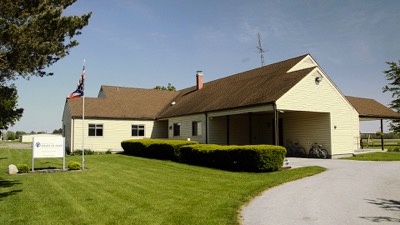Saturday, June 10th, 2017
Houses of Hope ready but empty
No live-in house managers available
By Aaron Snyder

Photo by Aaron Snyder/The Daily Standard
The women's House of Hope on Mud Pike west of Celina has been unoccupied since April due to a shortage of live-in house managers to oversee residents' day-to-day recovery.
CELINA - While construction of the men's House of Hope finished in January, residents have yet to move in.
The new house on Mud Pike west of Celina, sits fully furnished but unoccupied. Likewise, the women's House of Hope next door also has been empty since April.
The vacancies are due to a shortage of live-in house managers to oversee residents' day-to-day recovery. The women's program had to be suspended and the women sent elsewhere when the former house manager left.
"This is probably the toughest piece for us," said Hose of Hope board member and therapist Bobbi Stoner. "Finding someone who can live there and work with this type of person, burnout is high."
House managers oversee residents with cooking and house meetings. They help residents find jobs and guide them through the five phases of their journey to sobriety, all while living under the same roof.
Both houses are a sober-living environment, where residents voluntarily stay while refraining from drugs and alcohol.
While staying at the house, residents learn to live without their previous addictions.
"As I put it, I like to say they learn to juggle life," Stoner said. "Because they're working on their sobriety, working on abstinence, but they're also working on recovery."
While in action, the women's house saw varying success. In the two years the facility was operating, 14 women went through the program.
"We haven't always been successful," admits Sandy Huckemeyer, House of Hope executive director. "I believe there are different levels of success. If we have a girl who stays sober and off of drugs and off of alcohol and can function in the world and get their children back, that's a success to me."
Resident applications are being accepted from recovering addicts in Mercer County for both houses.
Stoner sees the recovered addicts as a compounding opportunity to grow the program.
"Our long-term goal is to help these women and men get on their feet and then get back into the community and stay productive and then help out with other people," she said.
To see a video of both the men's and women's House of Hope, go to
dailystandard.com/video.


